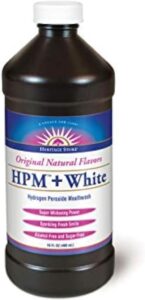Is It Safe To Use Hydrogen Peroxide As Mouthwash? Here’s What You Need to Know
Using hydrogen peroxide as mouthwash is a topic that raises many questions for people looking to enhance their oral health. It’s generally safe to use hydrogen peroxide in diluted forms for mouthwash, as long as you follow proper guidelines. Many people enjoy the benefits of its antibacterial properties, but there are also considerations you need to keep in mind to avoid potential risks.

If you’ve been curious about adding hydrogen peroxide to your oral care routine, you’re not alone. Understanding how to use it safely can help you maintain good oral hygiene. This article will explore the benefits and risks, share tips on proper usage, and answer some frequently asked questions to help you make informed decisions.
Key Takeaways
- Hydrogen peroxide can be effective for oral health when used correctly.
- Dilution and limited use are essential for safety.
- Understanding benefits and risks is important before use.
Understanding Hydrogen Peroxide
Hydrogen peroxide is a common substance that has many uses, from household cleaning to oral care. Knowing its properties can help you understand its role as a mouthwash. This section will cover its chemical nature and how it can be applied in mouth rinses.
Chemical Properties and Uses
Hydrogen peroxide (H2O2) is a simple compound that looks like water but has extra oxygen. This property makes it a powerful antiseptic and antibacterial agent.
It’s often used in different concentrations. Food-grade hydrogen peroxide is usually 35%, but when used for oral care, you might find it at around 1.5% to 3%. Lower concentrations are safer for daily use.
You can find it in numerous products, including cleaning agents and hair bleaches. Its antimicrobial properties help eliminate various bacteria, making it useful for disinfecting and promoting healing.
Hydrogen Peroxide as Mouthwash
Using hydrogen peroxide as a mouthwash can be beneficial when done correctly. It can help with oral hygiene by killing harmful bacteria in your mouth.
To use it safely, mix 1 part of 3% hydrogen peroxide with 2 parts water. This dilution ensures you get the benefits without the risk of harm. Some people also look to carbamide peroxide, which is another type often found in teeth whitening products.
Don’t use it daily for long periods. Short-term use is effective, especially for sore throats or gum inflammation. Remember to avoid swallowing it, as it can be harmful if ingested in larger quantities.
Benefits and Risks of Using Hydrogen Peroxide for Oral Care
Using hydrogen peroxide as mouthwash can have some interesting benefits, but it also comes with risks you should know about. It’s important to weigh both sides before adding it to your oral care routine.
Teeth Whitening and Antiseptic Benefits
One of the main benefits of hydrogen peroxide is its ability to help whiten teeth. When used in low concentrations, it can break down stains on your enamel, giving you a brighter smile. Many people find that rinsing with hydrogen peroxide regularly can reduce plaque buildup, which is great for preventing cavities and gum disease.
Additionally, hydrogen peroxide has strong antiseptic properties. This means it can kill bacteria that lead to bad breath or even gum inflammation. If you struggle with gingivitis, using hydrogen peroxide might help reduce the bacteria causing the problem. Just make sure to use a diluted solution, usually between 1.5% and 3%, to keep it safe and effective.
Potential Side Effects and Risks
While there are benefits, there are also some risks to consider. Using hydrogen peroxide too frequently or in high concentrations can lead to weakened enamel. This makes your teeth more prone to cavities. Sometimes, people experience side effects like nausea or vomiting if they accidentally swallow the mouthwash.
You might also face chemical burns if you use a stronger solution or don’t rinse properly. Some users report developing a black hairy tongue from the buildup of bacteria. Since everyone’s mouth is different, it’s best to start slow and monitor how your mouth reacts to avoid these issues.
Proper Usage and Precautions
When using hydrogen peroxide as a mouthwash, it’s important to follow safe practices. Knowing the right concentrations and guidelines can help you enjoy the benefits while avoiding any risks.
Safe Concentrations and Dilution
Using the right concentration of hydrogen peroxide is key. It’s best to stick with over-the-counter solutions that contain between 1.5% and 3% hydrogen peroxide. Higher concentrations can be harsh and may irritate your mouth.
If you’re mixing your own mouthwash, ensure you dilute it properly. A common method is to mix one part hydrogen peroxide with two parts water. This creates a safe solution for rinsing and gargling without causing harm.
Always remember to avoid swallowing the rinse. If you experience any discomfort, stop using it and consult a dental professional. They can provide advice tailored to your specific needs.
Guidelines for Use in Oral Hygiene
Using hydrogen peroxide can enhance your oral care routine. You can use it as a mouth rinse or gargle for short periods, about 30 seconds to one minute. This helps reduce gum inflammation and fight bacteria effectively.
It’s important not to overdo it. Aim for one to two times per week. This prevents any adverse effects while still keeping biofilm and bacteria at bay.
Some people prefer to combine hydrogen peroxide with baking soda to create a homemade mouthwash. This combination can also aid in whitening teeth and improving dental hygiene.
Always consult with a dental professional if you’re unsure. They can give you tailored advice on how to properly incorporate hydrogen peroxide into your oral care routine safely.

